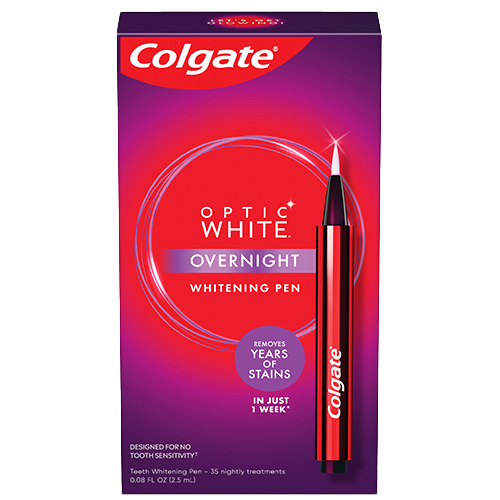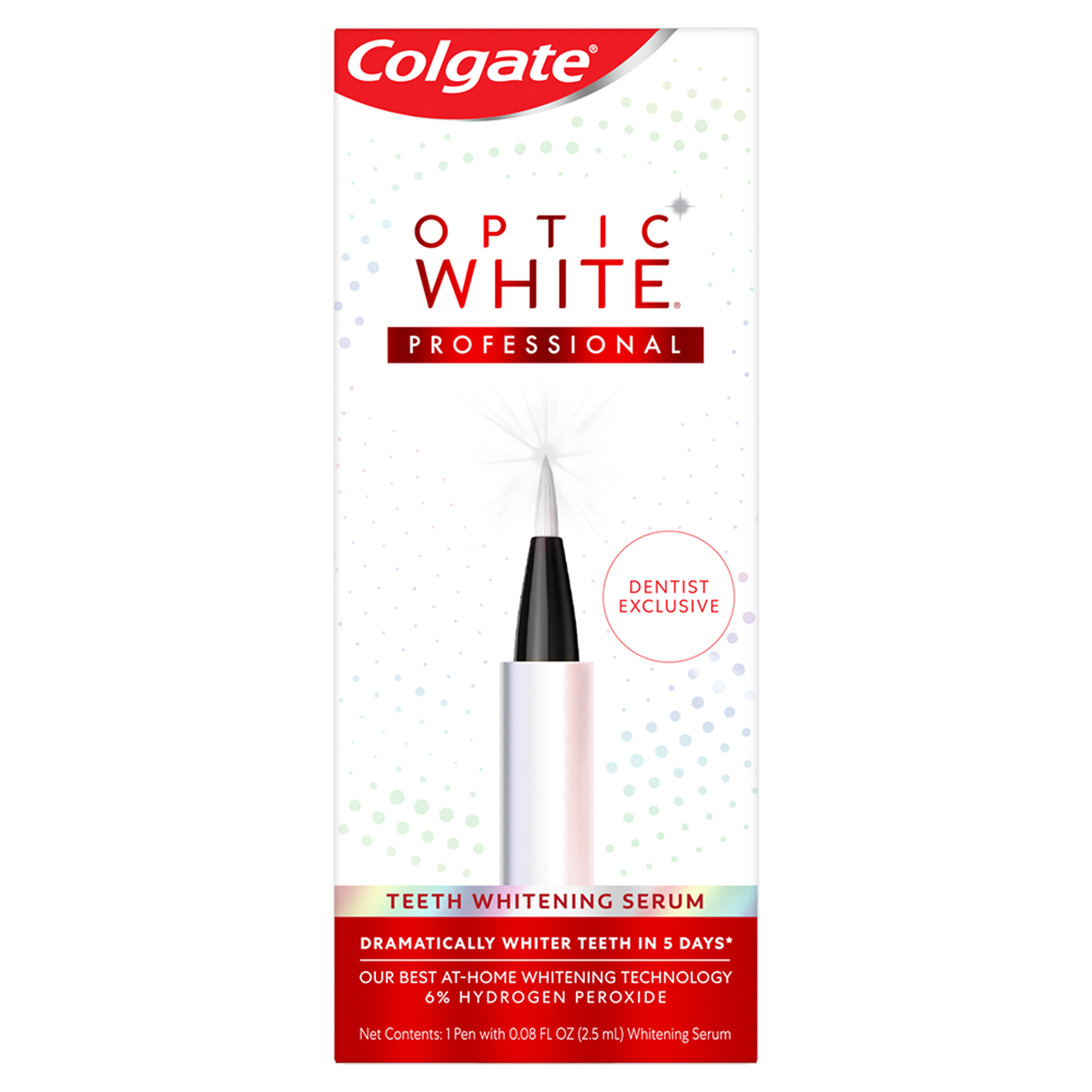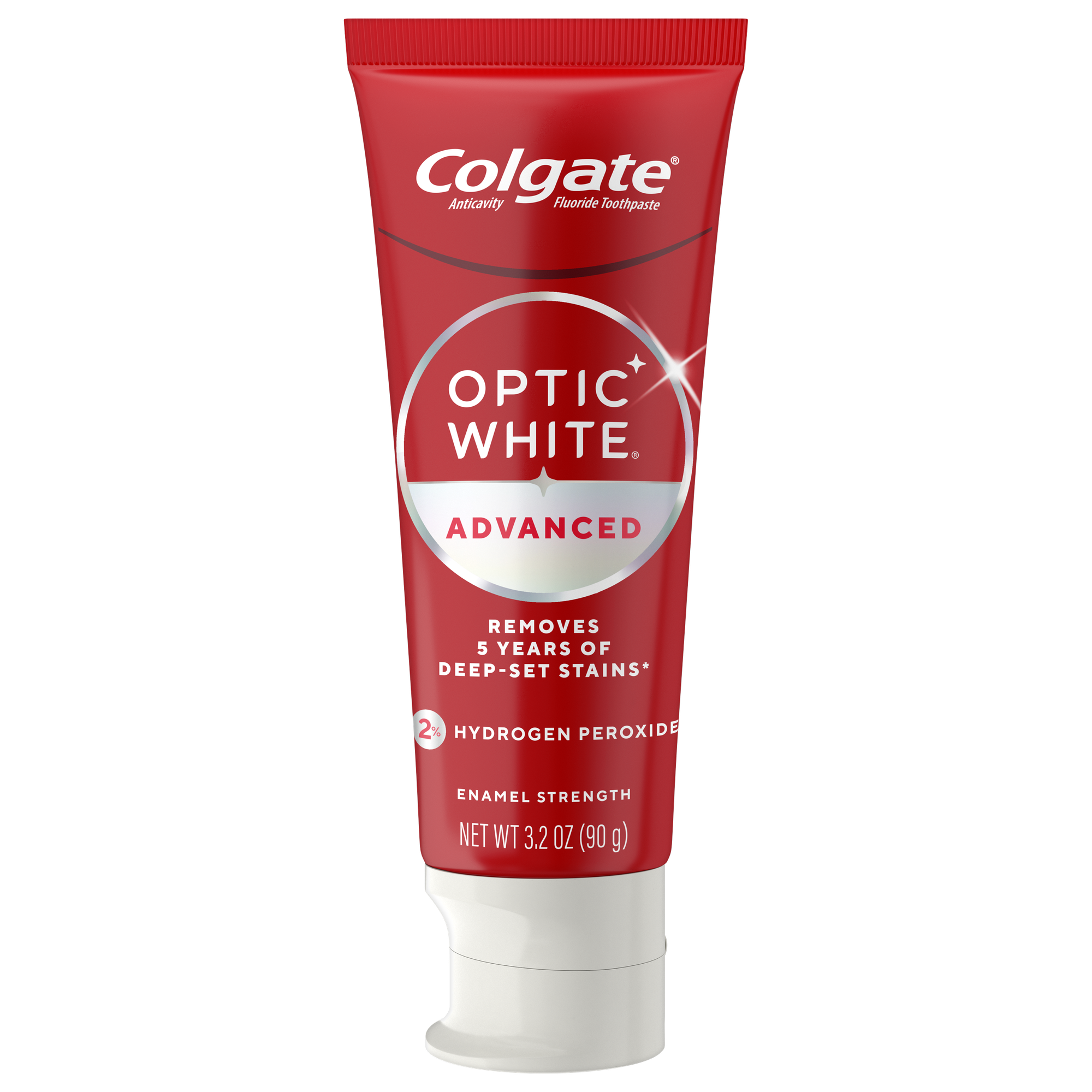What Are Whitening Strips?
Whitening strips are thin, flexible plastic strips coated on one side with a gel. The gel contains a mild bleaching agent – usually hydrogen peroxide or carbamide peroxide. You stick the strips gel-side-down on your teeth and leave them for a short while, and the bleaching agents in the gel whiten your teeth.
The bleaching agents work by penetrating the enamel of your teeth and breaking down colored pigments that cause tooth stains. That means teeth whitening strips are especially good for stains caused by strongly colored foods and drinks (think coffee, red wine, berries, etc.) or from using tobacco. They can also help to lighten discoloration caused by genetics, age, or medication use. However, as they contain low concentrations of bleaching agents, they may not give you the desired results if your teeth are very heavily stained. In such cases, you may want to discuss professional whitening with your dentist.

Overnight Teeth Whitening Pen
A teeth whitening pen with an enamel safe whitening serum formula designed for no tooth sensitivity.

Are Whitening Strips Safe?
You might be wondering: do whitening strips damage teeth? When used as directed, whitening strips are considered to be safe. However, the American Dental Association (ADA) notes that there is a risk of minor side effects.
The most common side effect when using whitening strips – or any product that contains bleaching agents – is tooth sensitivity. You might notice a sharp pain when your teeth are exposed to hot or cold foods or drinks, when you breathe in cold air, or when your teeth are touched.
Over-the-counter whitening strips contain low concentrations of bleaching agents, so any sensitivity you experience should be minor and will resolve in a few days. You might find it helpful to use a toothpaste for sensitive teeth in the meantime.
Another potential side effect is gum irritation from the bleach in the whitening strips. You can reduce this risk by applying the strips very carefully so that they only sit over your teeth, avoiding contact with your gum tissue. If your gums start to feel sore, remove the strips immediately and rinse your mouth with water.
The internet is awash with home remedies and viral whitening products, but these can range from ineffective to dangerous. It’s always best to buy whitening strips that have been tested and verified for effectiveness and safety. For best results, always follow the directions on the packaging.
What Happens if You Leave Whitening Strips on For Too Long?
You might be tempted to leave whitening strips on your teeth for a little longer, but this will increase the risk and severity of side effects like sensitivity and gum irritation. In some cases, overuse of whitening strips has even led to chemical burns on the gums. Over-bleaching can also damage your tooth enamel, leaving your teeth more vulnerable to staining – the exact opposite of what you’re trying to achieve!
If you’re not getting the results you want, don’t put your smile at risk! Consider asking your dentist about professional teeth whitening options instead. Your dentist is able to use stronger bleaching agents than you can get in store-bought products, and they can administer them safely while protecting you from side effects.
Can Kids Use Whitening Strips?
Younger people can be very self-conscious about their smiles, but is teeth whitening safe for kids? Can children use whitening strips?
Manufacturers of whitening strips generally state that they should not be used by children under 12 years old. While the American Academy of Pediatric Dentistry (AAPD) does believe that whitening is generally safe for children and teens when done correctly, they advise against tooth whitening in the mixed dentition phase. This is the age between approximately 6 to 12 years old, when children have a mix of both “baby” teeth and permanent adult teeth. There are two main reasons to avoid whitening strips in this stage:
The enamel of adult teeth is much thicker than that of baby teeth, so bleaching will affect them differently. Whitening strips might therefore leave your child with teeth of various different shades.
When new permanent teeth emerge, they will likely be a different shade than the existing permanent teeth that have been bleached. It will then be difficult to restore even coloring to all teeth.
In some cases, you and your dentist might feel that the benefits of teeth whitening for your child far outweigh these risks. If you do decide to go ahead with whitening strips for your under-12s, keep the following in mind:
If not used correctly, whitening strips can harm a child’s developing enamel. To avoid this, it’s best to use whitening strips under the guidance of your dentist.
Your dentist might suggest leaving whitening strips on your child’s teeth for less time than stated on the packaging. If so, it’s important to heed the dentist’s advice, as the packaging instructions will have been written with over-12s in mind.
Always place the whitening strips for your child to avoid contact with the gums.
Always supervise your child when using whitening strips to avoid the risk of swallowing.
Can Teens Use Whitening Strips?
What about your older kids – are whitening strips safe for teens? According to the AAPD, teens can safely use whitening strips to brighten their teeth. However, it’s still important to supervise the process carefully and ensure that your teens don’t use whitening strips more often or for longer than instructed. Image concerns can be especially intense at this age, and they may not fully grasp the consequences of bending the rules to get the results they want!
Are There Any Alternatives to Teeth Whitening Strips?
Over-the-counter whitening strips are an affordable and convenient way for adults and teens to brighten their smiles, but they’re not the only options out there.
Whitening toothpaste. Perhaps the cheapest and simplest option, whitening toothpaste contains abrasives to help lift away stains. Some also contain very low levels of bleaching agents to target deeper stains.
Whitening pens. These contain bleaching gel that is brushed on the teeth and left to dry. They’re very convenient and great for quick, on-the-spot whitening.
Whitening trays. These trays are filled with bleaching gel and worn over the teeth like a mouthguard. Ideal for more advanced whitening needs, they can be found in drug stores or bought from your dentist.
In-office whitening. The most dramatic whitening comes from in-office procedures, where your dentist will use a max-strength bleaching gel and, in some cases, laser activation.
If you’re wondering whether whitening strips are right for you or your child, or you just want to explore all the options, your dentists will be happy to discuss these whitening products with you in more detail.
Don’t Forget Oral Hygiene!
Finally, remember that whitening strips and other products are no substitute for great oral hygiene and diet habits when it comes to a bright smile. To keep stains under control:
Make sure you and the kids are brushing twice a day with a fluoride toothpaste and flossing at least once a day.
Try to keep coffee, red wine, and other strongly colored drinks to a minimum.
Rinse with water after eating tomatoes, berries, and other bright foods.
Limit sodas, juices and energy drinks, especially for the younger members of the family.
ORAL HEALTH QUIZ
What's behind your smile?
Take our Oral Health assessment to get the most from your oral care routine
ORAL HEALTH QUIZ
What's behind your smile?
Take our Oral Health assessment to get the most from your oral care routine















